Here’s how Apple has cut its emissions 55% since 2015
GreenBiz
APRIL 18, 2024
The company aims for a 75 percent reduction by 2030.
This site uses cookies to improve your experience. To help us insure we adhere to various privacy regulations, please select your country/region of residence. If you do not select a country, we will assume you are from the United States. Select your Cookie Settings or view our Privacy Policy and Terms of Use.
Cookies and similar technologies are used on this website for proper function of the website, for tracking performance analytics and for marketing purposes. We and some of our third-party providers may use cookie data for various purposes. Please review the cookie settings below and choose your preference.
Used for the proper function of the website
Used for monitoring website traffic and interactions
Cookies and similar technologies are used on this website for proper function of the website, for tracking performance analytics and for marketing purposes. We and some of our third-party providers may use cookie data for various purposes. Please review the cookie settings below and choose your preference.
 2015 Related Topics
2015 Related Topics 
GreenBiz
APRIL 18, 2024
The company aims for a 75 percent reduction by 2030.

GreenBiz
OCTOBER 4, 2021
billion in investments since 2015. Innovators in the space have seen more than $1.29
This site is protected by reCAPTCHA and the Google Privacy Policy and Terms of Service apply.

GreenBiz
MARCH 11, 2024
Amazon has cut more than 37,150 metric tons of plastic packaging since 2015, but still uses twice that amount annually.

Renew Economy
NOVEMBER 19, 2024
Renewables growth from 2015-2025 is on track to cut Australia’s electricity sector emissions by nearly 40% in a decade, equivalent to emissions from all the nation’s cars, commercial vehicles and planes.

Corporate Knights
JANUARY 13, 2025
The landmark Paris Agreement was forged in the corridors of COP21 back in 2015. Launched in 2015 by a group of Pacific Island nations, the initiative now has the official support of 13 national governments and the European Parliament. Now, a decade later, as global temperatures rise past the critical 1.5C Shes changed her mind.

GreenBiz
AUGUST 12, 2020
The amount of renewable diesel used in California tripled between 2015 to 2019 to 620 million gallons. Between 2015 and 2018, the consumption of renewable natural gas by natural gas fleets grew by 475 percent, and in 2019 in California, 80 percent of the natural gas used for transportation was renewable.

Renew Economy
APRIL 9, 2025
Palau president urges Australia to persist in the bid to co-host climate talks in 2026, and takes a swipe at the leader of the federal opposition for his infamous 2015 faux pas. The post No joke: Climate impacts “not a punchline:” Palau president takes swipe at Dutton appeared first on RenewEconomy.

3BL Media
FEBRUARY 5, 2025
Since 2015, JUST Capital has surveyed more than 182,000 Americans on their expectations for corporate behavior. JUST Capital then evaluates the largest U.S. The JUST 100 list showcases top-performing Russell 1000 companies that demonstrate leadership in aligning business success with the priorities of the American public.

3BL Media
FEBRUARY 4, 2025
In this latest blog Dr. Marsha Dickson, President and Co-founder of the Better Buying Institute (BBI), reflects on the organization's journey since its inception in 2015 and looks ahead to its future now that key Better Buying assets have become part of Cascale.

Renew Economy
DECEMBER 12, 2024
The decision to export gas from the east coast in 2015 has driven up prices to the point where it is destroying domestic demand and wont be fixed with new supply, a new analysis suggests. The post “Gas eating gas:” Analysis warns new supply will do nothing to alleviate high prices appeared first on RenewEconomy.

Corporate Knights
MAY 27, 2024
After Conservative leader Stephen Harper became prime minister in 2006, and until Harper was voted out in 2015, Poilievre voted in lockstep with his party on a barrage of regulation-eviscerating bills, according to federal Green Party leader and MP Elizabeth May.

GreenBiz
MARCH 4, 2021
To receive a lower rate the company must show a net-positive impact on biodiversity in its forests in Finland and a 65 percent reduction in CO2 emissions from fuels and purchased electricity between 2015 and 2030. Abundant research revealing just the urgency and existential nature of the biodiversity crisis has heightened awareness.
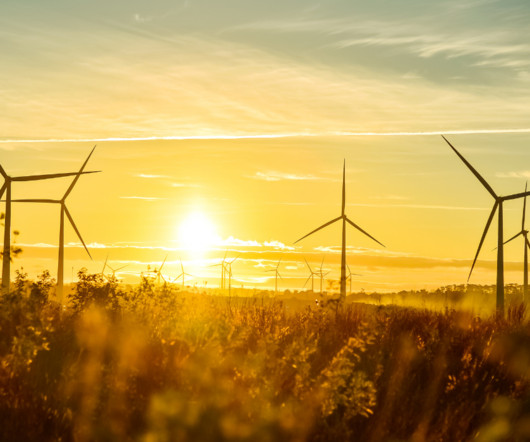
Corporate Knights
DECEMBER 18, 2024
Canadas emissions would be higher today without the actions taken to date by all levels of government since 2015. Climate policies are working with industrial carbon pricing leading the pack. But getting closer to Canadas emission targets still requires more action.

ESG Today
JANUARY 8, 2025
Founded in 2015, Trucks VC aims to fund transportation-focused startups. LP investors in the fund include a broad range of transportation-focused companies including vehicle manufacturers, Tier 1 suppliers, tire manufacturers, insurance providers, rental car agencies and airline carriers.

3BL Media
DECEMBER 18, 2024
All of Lenovos sites in the EMS scope are ISO 14001:2015 certified. See here to view Lenovos Global ISO 14001:2015 certificates. The scope encompasses these same activities when performed by its subsidiary and/or affiliate companies.
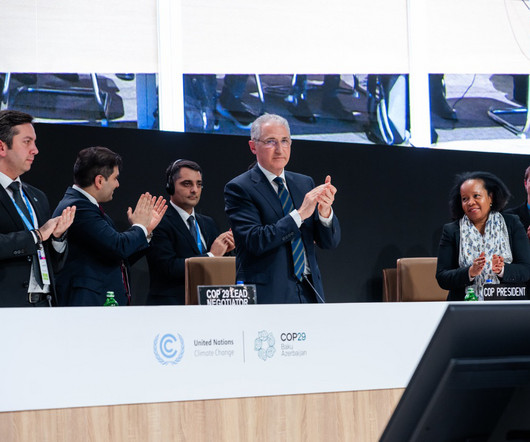
ESG Today
NOVEMBER 25, 2024
This would represent a significant increase in climate finance for developing nations following a $100 billion by 2020 goal initially set in 2009, and extended to 2025 by the Paris Agreement in 2015. By 2020 annual climate finance mobilization had reached $83 billion, according to OECD estimates.

3BL Media
FEBRUARY 5, 2024
JUST Capital has engaged more than 170,000 participants since 2015. For the annual Rankings, JUST Capital collects and analyzes corporate data to evaluate the 1,000 largest public U.S. companies across 20 issues identified through comprehensive, ongoing public opinion research on Americans’ attitudes toward responsible corporate behavior.

3BL Media
JANUARY 30, 2025
For context, the SDGs are a collection of 17 global goals set by the UN General Assembly in 2015 after considerable consultation with NGOs, companies and other stakeholders. Originally published in Forbes. 2025 marks just five years until 2030, the target for achieving the UN Sustainable Development Goals (SDGs).

GreenBiz
OCTOBER 19, 2020
Generation Z, those born between 1996 and 2015, are current consumers, future business leaders and the future of this world. Why Gen Z voices matter in making business sustainable. Isabel LoDuca. Mon, 10/19/2020 - 01:00. Yet, Gen Z is unlike any other generation to date.

Corporate Knights
APRIL 9, 2024
And since 2015, there has been a 30% shortfall between what the government has committed to spending on climate and what it has actually invested. While Freeland’s $120-billion tally is a useful starting point, quantifying how much the Canadian government has already spent, going back to 2015, on climate solutions is a harder nut to crack.

ESG Today
DECEMBER 3, 2024
Coca-Cola also replaced its 2030 climate goal to reduce absolute emissions by 25% on a 2015 basis with a new target that does not include an absolute emissions goal, but aims to reduce Scope 1, 2 and 3 emissions in line with a 1.5°C C trajectory by 2035, from a 2019 baseline.

3BL Media
MARCH 21, 2022
As of 2021, Kimberly-Clark used over 34 percent less water at its facilities in water-stressed areas than it did in 2015. Kimberly-Clark’s facility in Santa Cruz, Bolivia has reduced its water usage by more than 86 percent since 2015. Water savings at this facility are enough to fill more than 86 Olympic-size swimming pools.

3BL Media
MARCH 4, 2025
Certified to ISO 9001:2015, ISO 14001:2015, and ISO 45001:2018 standards by TV SD, SZW has been driving sustainable waste solutions pan-India since its incorporation in 2013.

3BL Media
MAY 23, 2022
The company is targeting a carbon emissions reduction of 76% in the UK across scope 1 and 2 by March 2023 (compared to a 2015 baseline). All of these efforts contribute to Kimberly-Clark’s global goal to cut its scope 1 and 2 greenhouse gas emissions by 50% by 2030, which is based on a 2015 base year.
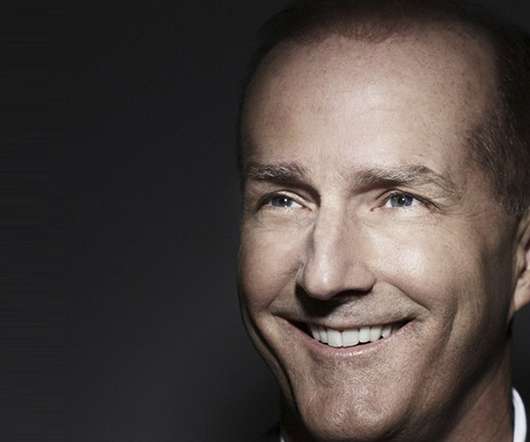
GreenBiz
OCTOBER 8, 2020
Crane was instrumental in leading NRG into renewables and other clean energy sectors and was ousted in late 2015 after its stock tanked. Last week, former NRG Energy CEO David Crane joined the frenzy. . Disclosure: Crane is a former GreenBiz editor at large, and you can read his body of work here.)

ESG Today
OCTOBER 29, 2024
Founded by CEO Yann Risz and COO Craig Cammarata in 2015, Massachusetts-based Aligned Incentives offers an AI-powered sustainability enterprise platform aimed at enabling global companies with extensive supply chains to measure and improve their societal impacts across multiple dimensions.
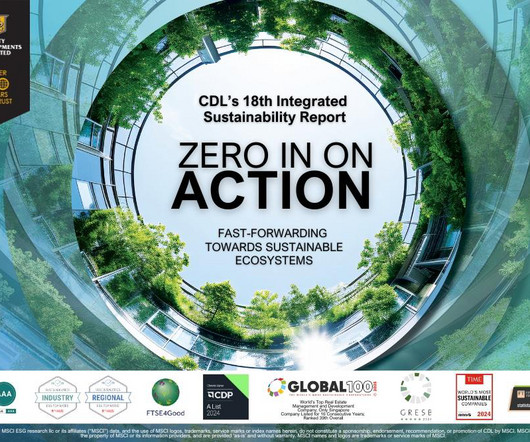
3BL Media
APRIL 13, 2025
Since 2008, CDLs framework has incorporated the Global Reporting Initiative (GRI) Standards at its core, adding various framework over the years: CDP (2010), Global Real Estate Sustainability Benchmark (GRESB) (2013), Integrated Reporting Framework (2015), SDG Reporting (2016), Task Force on Climate-related Financial Disclosures (TCFD) Recommendations (..)

3BL Media
MARCH 24, 2025
TNFD was modeled after the Task Force on Climate-related Financial Disclosures (TCFD), which was created in 2015 by the Financial Stability Board (FSB) as a framework for climate risk assessments.

Corporate Knights
APRIL 9, 2024
And since 2015, there has been a 30% shortfall between what the government has committed to spending on climate and what it has actually invested. While Freeland’s $120-billion tally is a useful starting point, quantifying how much the Canadian government has already spent, going back to 2015, on climate solutions is a harder nut to crack.

3BL Media
MARCH 28, 2025
This aligns O-I with the target of the 2015 Paris Agreement to limit the temperature increase to 1.5 Aligning with the Paris Agreement The elevated sustainability goals reflect O-Is decisive action to better position the company as a leader in sustainable glass manufacturing. The 47% GHG reduction aligns O-I with a 1.5-degree
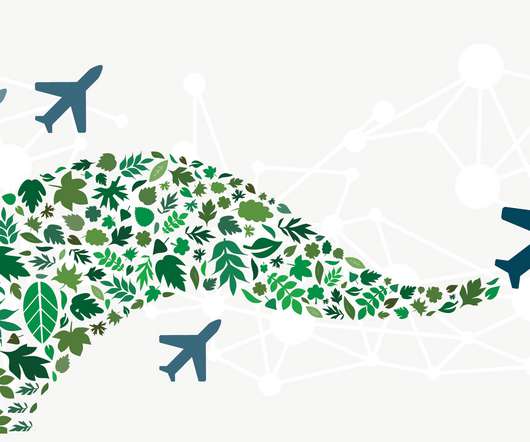
GreenBiz
JULY 8, 2020
Amazon began growing its fleet of 20 airplanes in 2015. The vast majority of goods in the U.S. are shipped by trucks, but a small and rapidly growing segment of goods are shipped by planes. . This air cargo is not only one of the fastest-growing shipping methods, it's also one of the most carbon-intensive.
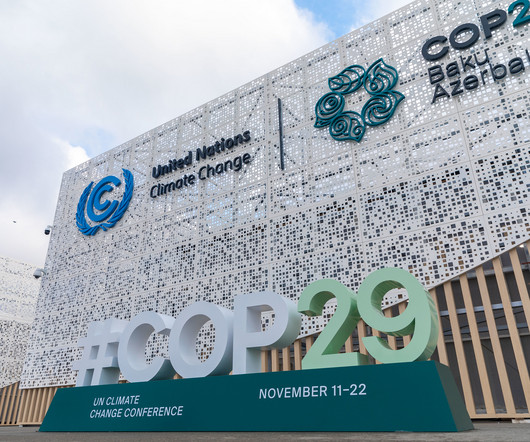
Corporate Knights
NOVEMBER 22, 2024
The climate plans of both companies, like those of the majority of the fossil fuel industry, are incompatible with the goals of the 2015 Paris Agreement between nations to keep global heating “well below” 2 degrees Celsius (3.6 degrees Fahrenheit) above the historic average, according to a May report by Oil Change International.

ESG Today
JANUARY 21, 2025
The SBTi was founded in 2015 with the goal to establish science-based environmental target setting as a standard corporate practice. The achievement marks significant growth for the organization, with the number of companies committing to climate targets rising by 29% over the past year from 7,425.

3BL Media
APRIL 11, 2022
year over year between 2015 and 2020. So, it’s an honor for us to top out as first in a list of some of the world’s biggest brands, having achieved a reduction in core emissions intensity (scope 1 and 2) of 46.8%

ESG Today
DECEMBER 19, 2024
Catalyst forms part of Breakthrough Energy, established by Gates and other private investors in 2015, to support the development of net zero-focused technologies. Initial technology focus areas for Catalyst include direct air capture, green hydrogen, long-duration energy storage, and sustainable aviation fuel.

3BL Media
AUGUST 8, 2022
Since 2015, the organizations have collaborated on this free, interactive online resource that lets families set healthy tech limits together. The family-focused online safety tool is updated with a focus on inclusivity, accessibility, user experience, and content. SOURCE: NortonLifeLock. The Smart Talk has never been more important.

ESG Today
NOVEMBER 13, 2024
Founded in 2015, Sympower provides solutions aimed at unlocking the flexibility of electric assets across industries, by temporarily adjusting the power of machines and processes through automated demand response capabilities. million (USD$22.6
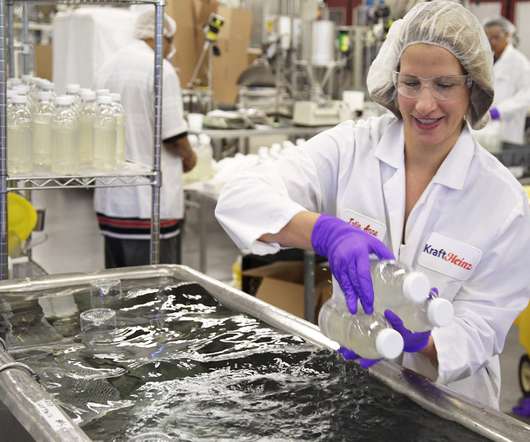
GreenBiz
OCTOBER 28, 2020
Through 2019, it managed a 1 percent reduction against a 2015 baseline. The company had hoped to reduce consumption by 15 percent by this year, against a 2015 baseline, but it actually increased water use by 1 percent per metric ton of product produced. . Through 2019, it has achieved 70 percent.

3BL Media
MAY 5, 2022
faster than the aggregate industry-wide improvement made during the period 2015-2020. The business-as-usual “baseline industry trend” estimates global energy use for 2020-2025 following the same historical trend observed in 2015-2020 data. One Year Progress Update. So how are we doing?

GreenBiz
APRIL 15, 2021
We shifted course dramatically in 2015, realizing that the only way forward to run a viable sustainable company is by choosing the sustainable way, that is, helping decarbonize our economy, digitize our infrastructure and electrify consumption," he offered.
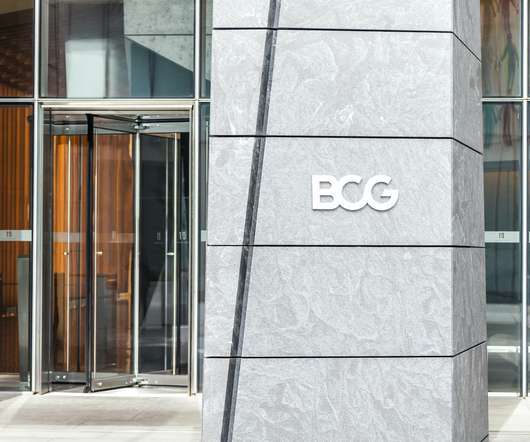
GreenBiz
SEPTEMBER 1, 2020
It committed to delivering up to $1 billion in pro bono consulting work for social impact projects between 2015 and 2025. (So It has reduced its direct emissions by 70 percent since 2011, with a pledge to reach 90 percent by 2040. So far, it has delivered about $335 million.). Corporate Strategy. Carbon Removal.

3BL Media
AUGUST 8, 2022
Paul's School Board of Trustees and was chair of the Investment Committee from July 2015 to June 2020. Rowe Price from Quidoo, an international consulting firm he started and led for over a decade, merging the firm in 2015. Sharps currently serves on the Board of the Baltimore Curriculum Project. He previously served on the St.

3BL Media
JULY 25, 2022
The DEI was launched in 2015 by Disability:IN and The American Association of People with Disabilities (AAPD) and is acknowledged today as the most robust disability inclusion assessment tool in business.
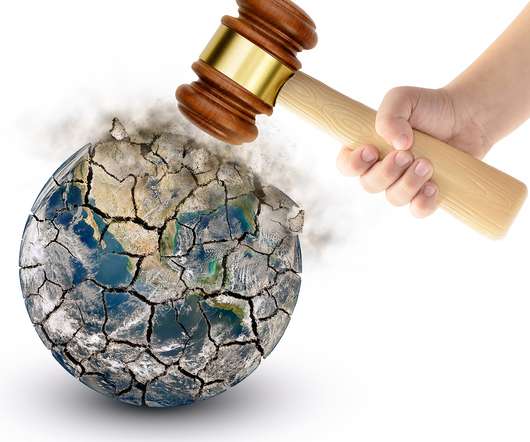
GreenBiz
OCTOBER 13, 2020
The study analyzed litigation, transactional and lobbying work conducted from 2015 to 2019. According to the group’s scorecard , Vault 100 firms: litigated 286 cases exacerbating climate change (versus three cases mitigating it). supported $1.316 trillion in transactions for the fossil fuel industry.
Expert insights. Personalized for you.
We have resent the email to
Are you sure you want to cancel your subscriptions?

Let's personalize your content